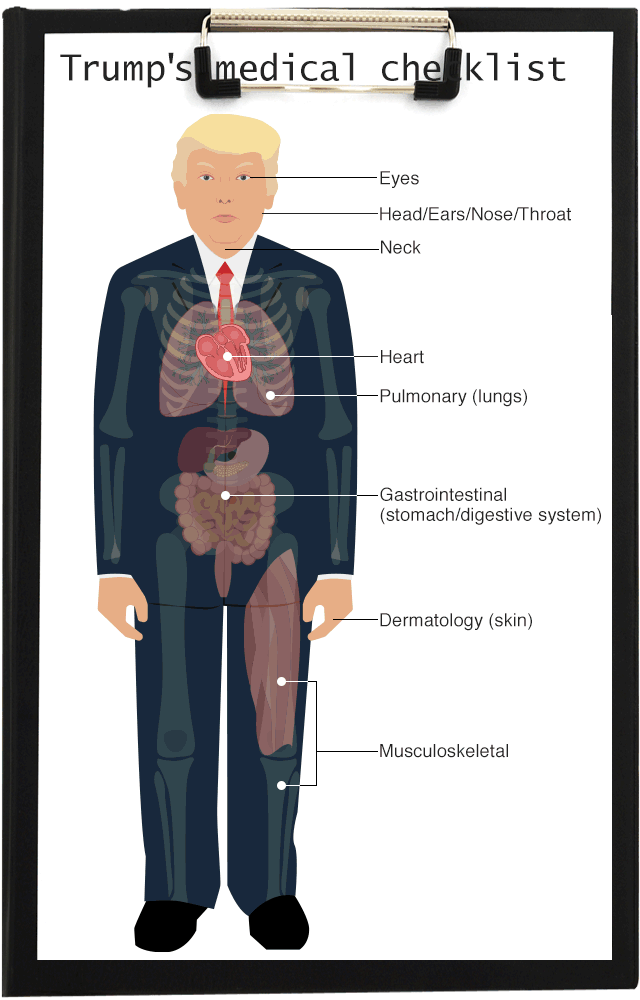Trump's Heart Health: Key Findings & Concerns [Analysis]
Is the health of a former president a matter of public concern? The answer, in the case of Donald J. Trump, appears to be a resounding yes, given the serious heart concerns revealed by his physical exams, according to cardiologists not associated with the White House.
From Washington, the whispers of medical assessments have reached a fever pitch, particularly those related to the health of former President Donald Trump. The news, delivered on a Wednesday, highlighted the gravity of the situation: cardiologists expressed significant concerns regarding his cardiovascular health, specifically pointing to elevated levels of certain markers indicative of potential problems. This has ignited a renewed focus on the former president's medical history, particularly the diagnosis of coronary artery disease in 2018.
This diagnosis, unfortunately, is not uncommon, especially among white males in his age demographic. The condition itself is characterized by the gradual narrowing of the coronary arteries, usually due to the buildup of plaque. This plaque, over time, can restrict blood flow to the heart, potentially leading to severe complications such as heart attacks. However, the medical update on Trumps health lacked certain detailed metrics. Specific figures regarding weight loss and other crucial health indicators were notably absent.
| Category | Details |
|---|---|
| Full Name | Donald John Trump |
| Date of Birth | June 14, 1946 |
| Place of Birth | Queens, New York City, New York, U.S. |
| Education | Fordham University (attended) & University of Pennsylvania (B.S.) |
| Spouse(s) | Ivana Zelnkov (m. 19771992), Marla Maples (m. 19931999), Melania Trump (m. 2005present) |
| Children | Donald Trump Jr., Ivanka Trump, Eric Trump, Tiffany Trump, Barron Trump |
| Political Party | Republican |
| Political Offices Held | 45th President of the United States (20172021) |
| Business Ventures | Real estate development, entertainment, branding |
| Noteworthy Achievements | President of the United States, successful businessman |
| Health Concerns | Coronary artery disease (diagnosed 2018), elevated calcium score |
| Alcohol Consumption | Abstains from alcohol (as of 2018) |
| Link to Reliable Source | White House Archives |
Cardiologists have emphasized that the tests performed on the former president show a moderate risk for cardiac events within the next decade. Events such as heart attacks and strokes are potentially a significant concern, and could be reduced by adopting healthy lifestyle modifications. This assessment underscores the importance of preventative measures and highlights the delicate balance between monitoring and intervention in managing cardiovascular health.
The health of public figures frequently falls under intense public scrutiny, often amplified by political agendas and the relentless news cycle. The circulation of misinformation, especially regarding health, can quickly become a threat in a climate of constant updates. This reality was exemplified by the spread of a false report from a dubious news generator suggesting Donald Trumps death due to a heart attack. These kinds of reports are a sharp reminder of how quickly rumors can circulate, and how easily they can become a source of panic.
A critical piece of the medical puzzle lies in the 2018 coronary CT calcium scan. This test, a type of heart scan, assesses the buildup of calcium in the arteries, providing valuable insight into the progression of coronary artery disease. Trumps scan revealed a form of heart disease, a condition that is unfortunately common for white males in his age bracket. This information enables doctors to make more informed decisions regarding monitoring and treatment.
In 2018, various reports confirmed that Trump does not drink alcohol. This decision can be attributed to witnessing the struggles of his older brother, Fred Jr., who suffered from alcoholism. Fred Jr.s battle with the disease, which contributed to his untimely death, had a profound impact on Donald Trump's life, influencing his choices and highlighting the significance of personal health.
Another significant data point in the evaluation is the calcium score, which was reported by Dr. Jackson to be 133. This score is more than just a number; it serves as a crucial indicator of the severity of plaque buildup in the arteries. As noted by Dr. Gupta, scores above 100 are linked to a higher likelihood of developing complications such as heart attacks. These numbers give a very good indication of cardiovascular risks.
It is important to consider the context: At 71 years old when the scan was done, Trump's calcium score of 133 placed him in the 46th percentile when compared to others of his age and ethnicity. This percentile ranking, though a specific metric, also provides an important perspective; it shows how Trump's health compares to others, offering a relative evaluation of his risks.
The spread of misinformation regarding Trump's health is not a new trend. A headline from December 19, 2016, screamed Donald Trump Dead from a Fatal Heart Attack! from a site called thenewyorkevening.com. This headline was accompanied by a misleading image, clearly highlighting the potential for deception and sensationalism within online news. This incident reflects the challenges in discerning fact from fiction in the digital era.
Examining the former presidents health compels a closer look at the broader landscape of information, media, and the complexities surrounding the health of prominent figures. The medical reports, the news cycles, and the online narratives all create a complex story. While providing a detailed medical examination is critical, it underscores the need for credible reporting, responsible public discourse, and a critical approach to information. These factors play an important role in ensuring that individuals are able to make informed decisions in this era of readily available information.
The case of Trumps health is not just about a single individual, but a reflection of a wider culture, and how society navigates the intersection of media, politics, and public health. As the information is processed and the story unfolds, it is important to remember that while public figures are subjected to intense scrutiny, accurate and responsible reporting remains important.
The medical history of Donald Trump offers a clear insight into the complexities of health within the context of political influence. His diagnosis of coronary artery disease in 2018, and his calcium score of 133, are indicative of potential heart health concerns, particularly considering his age and demographic background. These data points are essential for tracking and management. It is important to remember that maintaining the correct information and separating it from the noise will lead to a better understanding of this ongoing story.



Detail Author:
- Name : Kacie Crona
- Email : schimmel.ciara@hotmail.com
- Birthdate : 1988-12-20
- Address : 6839 Will Dale Suite 166 Leschburgh, SD 76776
- Phone : (586) 968-4739
- Company : Pollich-Renner
- Job : Business Manager
- Bio : Atque cum et officia quis eum. Et quia inventore beatae dolores quod excepturi. Adipisci aut sapiente provident nisi.